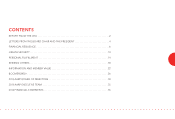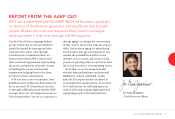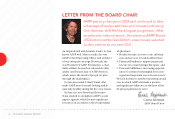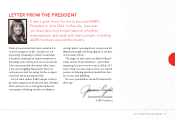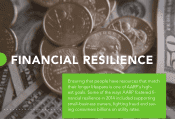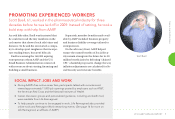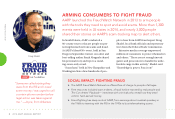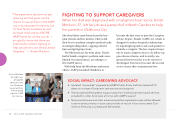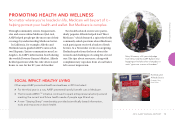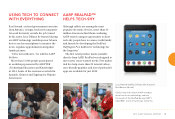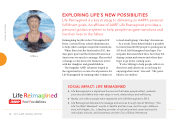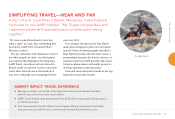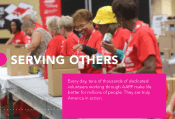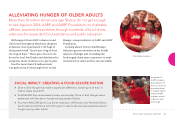AARP 2014 Annual Report Download - page 13
Download and view the complete annual report
Please find page 13 of the 2014 AARP annual report below. You can navigate through the pages in the report by either clicking on the pages listed below, or by using the keyword search tool below to find specific information within the annual report.
2014 AARP ANNUAL REPORT 11
HELPING FAMILY CAREGIVERS COPE
After his wife, Shirley, was diagnosed with ALS (often referred to as
Lou Gehrig’s disease), Johnny Lewis, a 66-year-old retired probation
supervisor, was startled at how complex caregiving could be.
“You know, there’s no book or manual you
can consult for this. It’s learn as you go,” the
Fort Worth, Texas, resident told the AARP
Bulletin in May.
To help the 42 million unpaid family
caregivers who strive to help a loved one live
independently, AARP added new tools to its
online Caregiving Resource Center (CRC)
in both English and Spanish. In addition,
more than 4,000 people downloaded a free
electronic book, AARP’s Juggling Work and
Caregiving, available in English or Spanish.
Since more than one in three Hispanic
households includes a caregiver, new public
service advertisements in Spanish and
English were unveiled by AARP and the Ad
Council. These poignant ads highlight what
happens when the roles of parents and chil-
dren are reversed.
SOCIAL IMPACT: MULTICULTURAL RESOURCES
>AARP’s online Caregiving Resource Center has received more than 25 million
page views since launching in late 2012.
>After an AARP research study explored Asian American caregivers’ needs and
attitudes, a 10-minute documentary for Filipino American households titled
Caregiving Dahil Mahal Kita (“Because I Love You”) helped families start often
difficult, but vital conversations.
>To help address caregiving issues for the most vulnerable Alzheimer’s patients,
many of whom are African American, AARP began collaborating with researchers
at North Carolina A&T State University.
Photo by Cooper Neil
VIDEO: This
poignant new
public service ad
highlighted what
happens when the
roles of parents
and children are
reversed.
Shirley and Johnny Lewis


